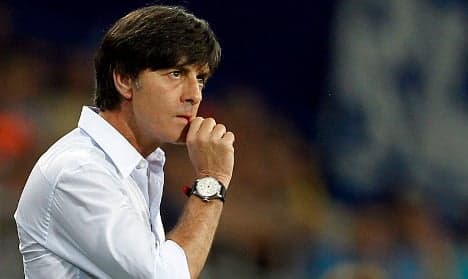Löw hopes team will learn from 2012 mistakes

The past year was a mixed one for Germany’s national football team coach Joachim Löw, as the man known as “Super Jogi” was wide praised in the first half of 2012 but blamed for many mishaps after that.
Löw told Die Welt daily on Monday that 2013 will “be a year of concentration, maybe also of experimentation and of preparation for the World Cup in 2014.” He acknowledged that the German national team is “very young and the learning curve has not been reached yet. That means the players will gain important additional experience.”
Löw came in for lots of criticism following Germany’s summer defeat in the European Cup semi-final against Italy and after tying a World Cup qualifying game against Sweden after the Germans were winning 4-0 after 60 minutes of play.
Löw said something like that "cannot happen again" and blamed not only the team’s youthfulness, but also on not sticking to tactics, failing to concentrate on the team’s strength and not being consistent after strong performances in the beginning of the year.
But the national coach was annoyed at some of the criticism following games against Italy and Sweden.
“When all of a sudden it’s about whether we pamper the players too much or whether we have to go back to our German traits in the traditional sense” – that bothers me. “We never let go of them.”
Löw said fighting and engaging in the game are basic requirements, but he considers “creativity” to also be a German trait.
The coach said he was personally affected by the massive criticism and also felt some of it was very unfair, which is why he chose to speak out about it in a press conference in August.
Asked whether he thought about throwing in the towel and quitting, Löw said, “No way, even with all the criticism. It so happens that we have set the bar very high due to our good performances over the last years. A defeat can put us into a situation like we experienced with the Euro. But you have to be able to deal with that.
“I knew that after the game with Italy it would be tough. We were all disappointed and the emotions were strong. But you have to push through that.”
Löw said if he couldn’t deal with that and ended up having to question everything after a defeat then he’d have real problems acting as the national trainer.
Asked how he would prevent such repeat performances, Löw said the team would be working on one or the other scenarios, but admitted that it’s impossible to simulate everything that could happen on the pitch. The defeats could however help the team.
“2012 was a year of learning,” he said. “Now everyone had to take the right consequences from that.”
The Local/mw
Comments
See Also
Löw told Die Welt daily on Monday that 2013 will “be a year of concentration, maybe also of experimentation and of preparation for the World Cup in 2014.” He acknowledged that the German national team is “very young and the learning curve has not been reached yet. That means the players will gain important additional experience.”
Löw came in for lots of criticism following Germany’s summer defeat in the European Cup semi-final against Italy and after tying a World Cup qualifying game against Sweden after the Germans were winning 4-0 after 60 minutes of play.
Löw said something like that "cannot happen again" and blamed not only the team’s youthfulness, but also on not sticking to tactics, failing to concentrate on the team’s strength and not being consistent after strong performances in the beginning of the year.
But the national coach was annoyed at some of the criticism following games against Italy and Sweden.
“When all of a sudden it’s about whether we pamper the players too much or whether we have to go back to our German traits in the traditional sense” – that bothers me. “We never let go of them.”
Löw said fighting and engaging in the game are basic requirements, but he considers “creativity” to also be a German trait.
The coach said he was personally affected by the massive criticism and also felt some of it was very unfair, which is why he chose to speak out about it in a press conference in August.
Asked whether he thought about throwing in the towel and quitting, Löw said, “No way, even with all the criticism. It so happens that we have set the bar very high due to our good performances over the last years. A defeat can put us into a situation like we experienced with the Euro. But you have to be able to deal with that.
“I knew that after the game with Italy it would be tough. We were all disappointed and the emotions were strong. But you have to push through that.”
Löw said if he couldn’t deal with that and ended up having to question everything after a defeat then he’d have real problems acting as the national trainer.
Asked how he would prevent such repeat performances, Löw said the team would be working on one or the other scenarios, but admitted that it’s impossible to simulate everything that could happen on the pitch. The defeats could however help the team.
“2012 was a year of learning,” he said. “Now everyone had to take the right consequences from that.”
The Local/mw
Join the conversation in our comments section below. Share your own views and experience and if you have a question or suggestion for our journalists then email us at [email protected].
Please keep comments civil, constructive and on topic – and make sure to read our terms of use before getting involved.
Please log in here to leave a comment.